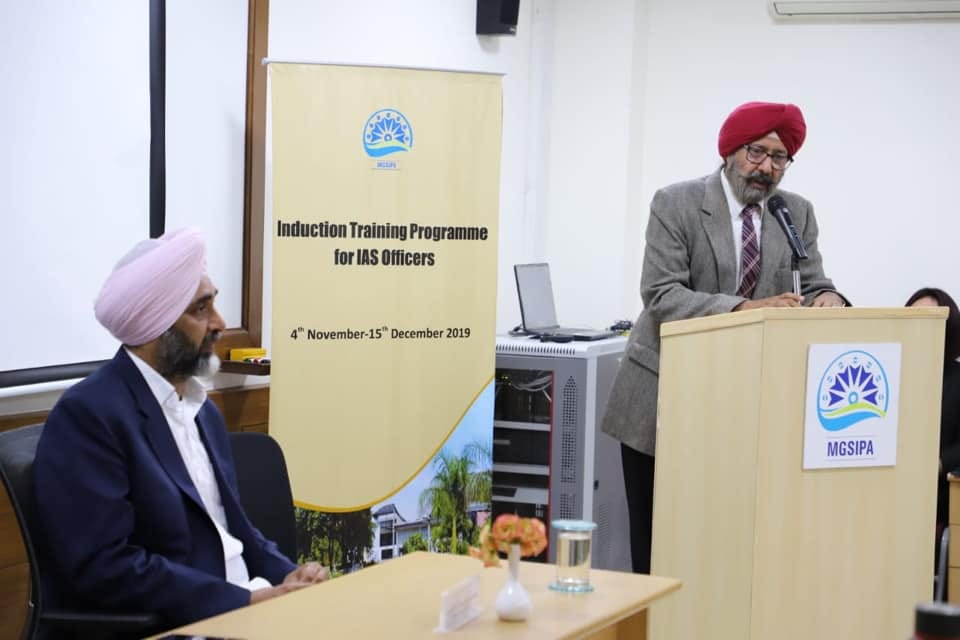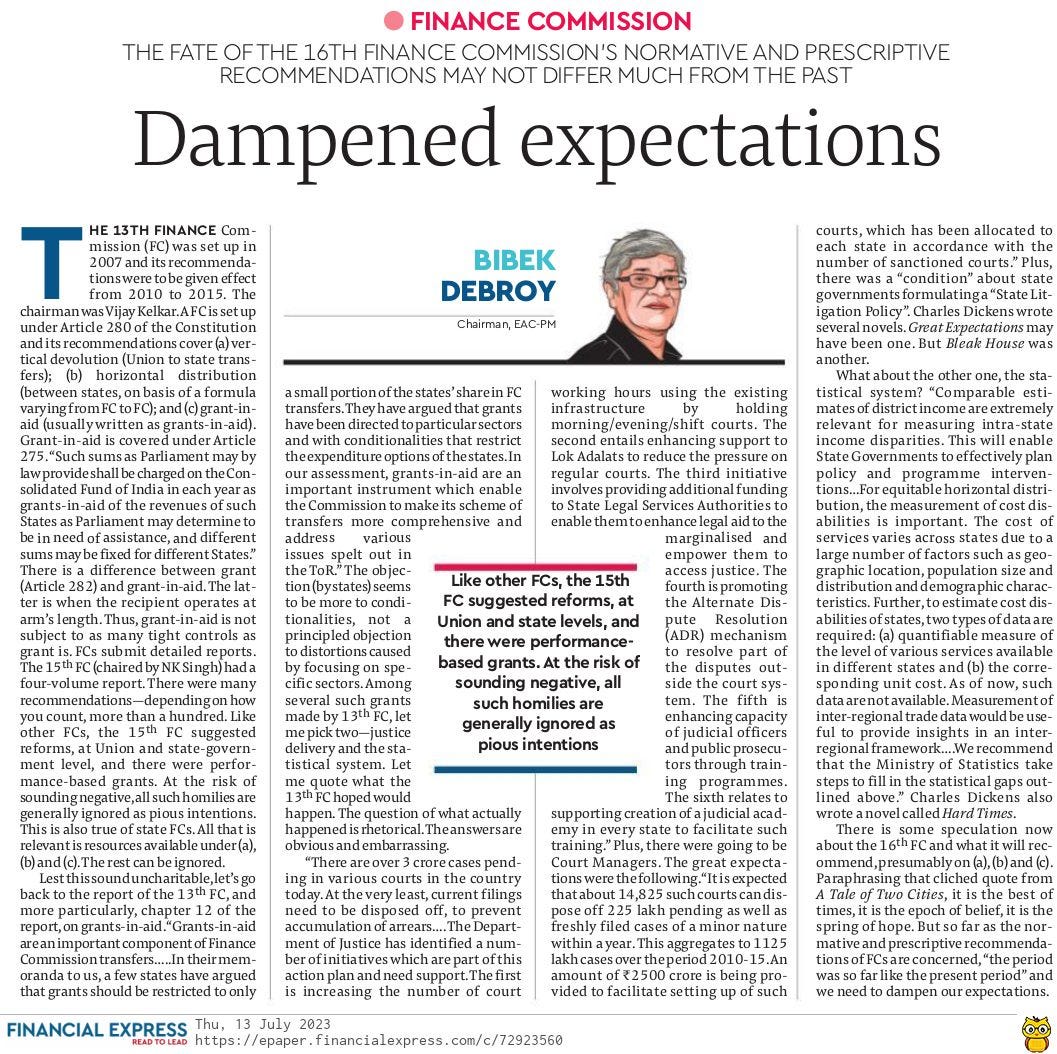From Volume to Value: Rethinking the Role the Finance Commissions
Redefining Finance Commissions: From Wishful Writings and Homilies to Impactful Recommendations for Fiscal Autonomy of the States
Mr. Bibek Debroy, Chairman of the Economic Advisory Council to the Prime Minister, today wrote an incisive critical analysis of the recommendations of various Finance Commissions in “The Indian Express” and “The Financial Express”1. Captioned “Dampened Expectations”, he specifically evaluated the recommendations of the 13th Finance Commission, headed by eminent economist Mr. Vijay Kelkar (2010-2015), with a focus on examining the effectiveness of grants-in-aid tied to reforms in specific sectors. He cited examples of the "justice delivery" and "statistical system" sectors and concluded, quoting verbatim from the 15th Finance Commission's report by Dr. NK Singh, that such attempts did not yield significant improvements in the targeted areas.
Similarly, normative and prescriptive recommendations of previous Finance Commissions have also failed to produce the desired results. Mr. Debroy ended his article by wondering whether the recommendations of the upcoming 16th Finance Commission, covering the period 2025-2030, would result in a report characterized by "the more things change, the more they remain the same."
Manpreet Badal, FM Punjab, with Anirudh Tewari, Principal Secretary, Finance, receiving Dr NK Singh, Chairman 15th FC, January 29, 2019 at Chandigarh Airport.
While it is justified to scrutinize targeted grants-in-aid, a broader examination of the structure within which the Finance Commission functions needs to be discussed in the public domain. This structure is not solely governed by constitutional provisions or the terms of reference set by the President (the Central Government). There are several aspects that need to be addressed, most of which undermine the financial and fiscal autonomy of the states, contradicting the spirit of federalism embedded in the Constitution. This is particularly evident following the nationwide implementation of the Goods and Services Tax (GST) and the formation of the GST Council, where the Central Government holds an effective veto power with 60% voting rights.
Let's proceed systematically and address the following points:
1. All central taxes, including levies, cesses, surcharges, and statutory fees imposed through legislation, should be part of the divisible pool under the purview of the Finance Commission. Artificially categorizing these taxes to exclude them from the Commission's purview and deprive states of their legitimate share should not be allowed. Even when levies or surcharges are imposed for specific purposes, they should continue to contribute to the divisible pool while adhering to the broad purpose for which they were imposed.
2. Over the decades since independence, the Central Government has retained around two-thirds of the central taxes, while only one-third has been allocated to the states. The states' share needs to be significantly increased, providing much-needed relief as most Indian states carry heavy debts.
3. The apportionment of shares among states has been a recurring dilemma for every Finance Commission, although it is rarely discussed in their final reports. Despite minor adjustments, most commissions have relied heavily on the "Gadgil Formula" or its modified versions, which prioritize population and area in determining the shares. Consequently, these shares remain largely unchanged.
4. The FCs face a moral dilemma of whether to compensate states in precarious fiscal positions or reward those that have exercised fiscal prudence and proper budget management, keeping their fiscal and revenue deficits in check. This issue is often addressed partially, without fully addressing the problem, as the underperforming states may wield significant political influence.
5. Turning to sector-specific grants-in-aid, which Dr. Debroy discussed, every Finance Commission seems to believe in the notion that "throwing money at a problem" will solve it. However, such allocations, though arguably modest, are often included at the behest of specialist members of the Commission who specialize in those areas. However, the recipient states' priorities may differ significantly, and the mere availability of funds does not guarantee optimal results. This approach also erodes the political and fiscal autonomy of states, where the state governments themselves should determine priorities and allocations, subject to legislative budgetary control. It is advisable to minimize, if not eliminate, such cosmetic grants-in-aid.
6. Finance Commissions often claim to reward states based on better performance in priority areas of reform. They provide specific parameters and objectively assess the performance of each state. However, they seem to overlook Goodhart's law, an economic adage that states "when a measure becomes a target, it ceases to be a good measure." Consequently, such devolutions become mere cosmetic exercises that do not lead to significant positive impacts beyond statistical improvements.
7. Recommendations of the Finance Commissions often include further allocations to Panchayati Raj Institutions (PRIs) or Urban Local Bodies (ULBs). However, many times these funds are not passed down by the respective state governments. While the Expenditure Division of the Finance Ministry may require a utilization certificate before releasing the next installment, there needs to be a better remedy. In this digital age, where central grants can be directly transferred to individual farmers' accounts, it should be feasible to ensure that these funds go directly to the accounts of beneficiary PRIs and ULBs, with intimation to the respective state government. This would significantly improve efficiency, remove a major roadblock, and strengthen the third tier of governance.
Will be have concise reports? It has become a trend, perhaps fashionable, to produce voluminous reports. However, one must wonder if anyone actually reads them, let alone implements their recommendations. These reports are often filled with polysyllabic profundity, platitudinous ponderosity, and pusillanimous pomposity—prosaic prose and verbal verbiage or meaningless data, information, and statistics. Effectively, what matters is the apportionment between the center and the states. Perhaps a future Finance Commission will make concise recommendations in a few pages and leave it to the wisdom of respective states to decide how to use the funds.
With Manpreet Badal, FM Punjab, 26 November, 2019.
Projections cannot be precise: It should be noted that the reports of every Finance Commission are based on futuristic predictions and projections, much like the Union Budget and state budgets. Predicting income streams from various taxes over a five-year period is nearly impossible, especially when tax rates can be adjusted with every Finance Bill. Furthermore, long-term interest rates are unpredictable. In this world of glorious uncertainties, the recommendations of the Finance Commission can, at best, serve as broad guidelines, while day-to-day financial and fiscal affairs are managed by the Finance Ministry and respective state finance departments.
Better statistics won’t yield better results: The 13th Finance Commission expressed disappointment over the lack of timely and credible statistics, which prevented them from estimating district-wise income levels, crucial for their final recommendations. Such data will never be available in a timely manner. However, as I often say, "It's better to be approximately correct than precisely wrong." Therefore, the Finance Commissions should make the best use of the available data and statistics and present fair, just, and equitable recommendations in a precise and readable format.
Charles Dickens wrote both "Bleak House" and "Great Expectations." While the former satirizes the British judicial system, the latter originally had an unhappy ending where Pip and Estella do not reunite. After significant backlash from readers, especially women, Dickens was compelled to rewrite the ending, making it a happy one. However, the reports of the Finance Commissions, like Dickens's novels, will not fundamentally change the state of affairs, irrespective how they are worded or how many pages they consume.
Put states at the centre2: Optimism is inherent in every democratically elected government, whether it pertains to political stability or economic growth. Yet, the verbose contents of Finance Commission reports, filled with wishful writings and homilies, fail to guarantee the desired outcomes. Rather than fixating on these observations, it is crucial for the center and the states to prioritize sound fiscal management and citizen-centric governance. The moment calls for a redefinition of the Finance Commissions' role, moving away from cumbersome volumes towards concise, influential recommendations that prioritize fiscal autonomy and empower states.
July 13, 2023 edition.
Pun intended.




